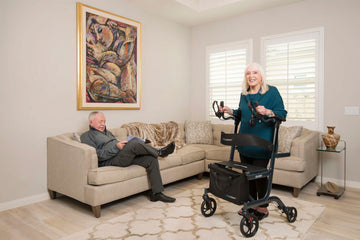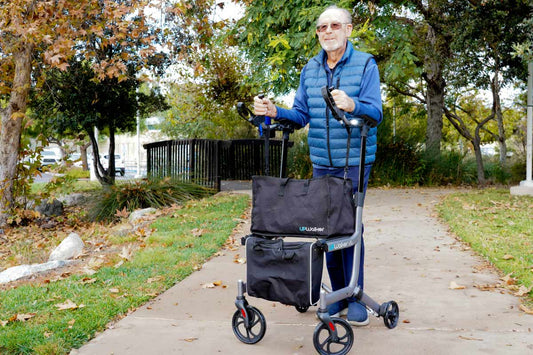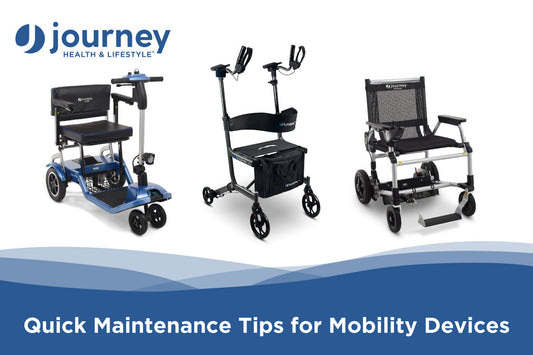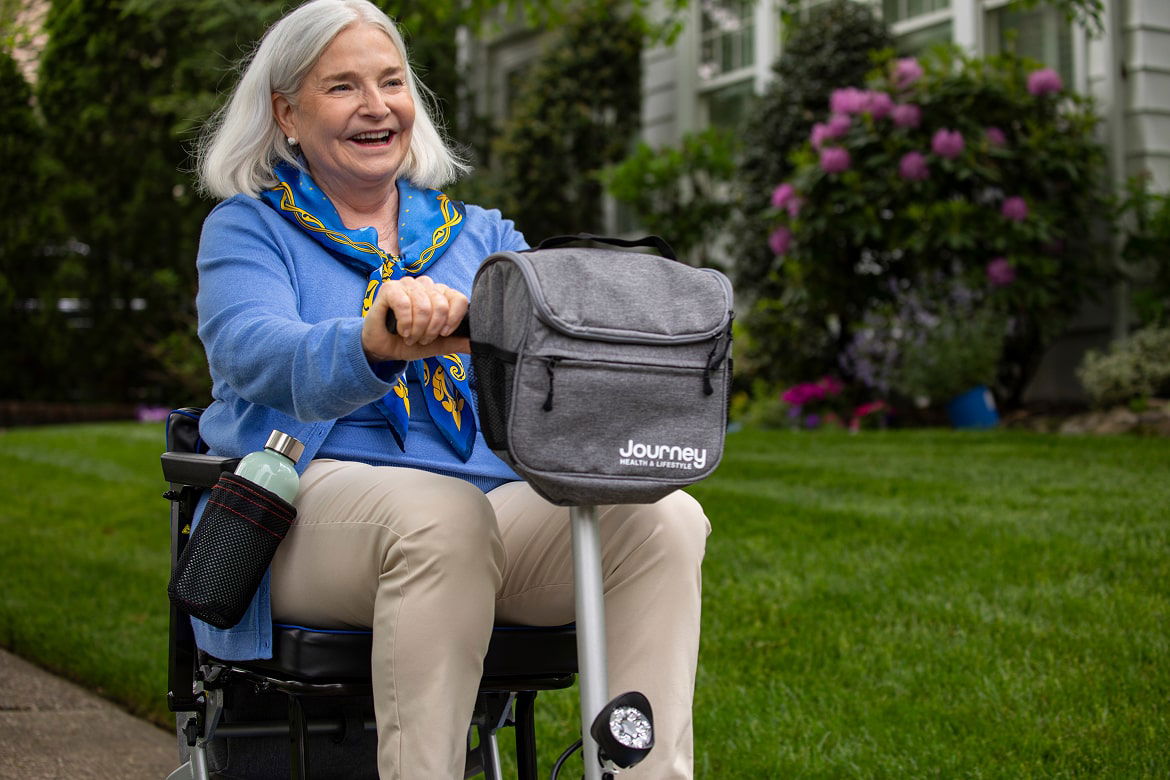M-F 9:30am - 7pm EST
How to Choose the Right Mobility Aid: A Complete Guide
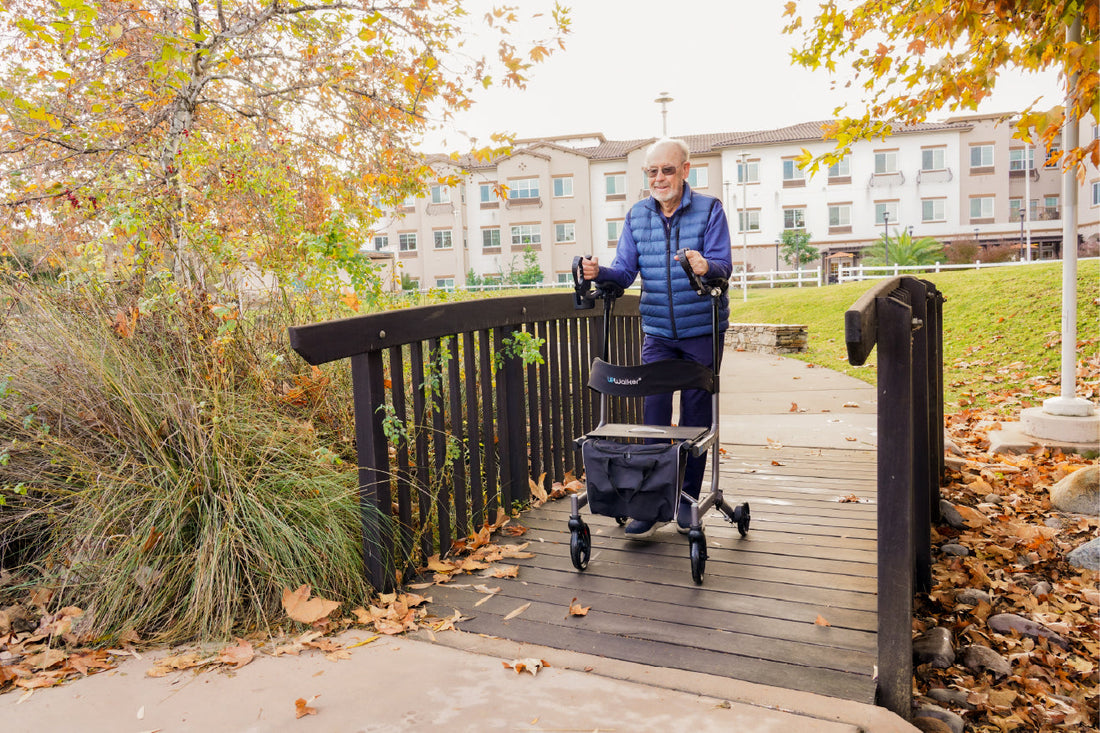
Mobility aids are essential tools that empower individuals facing mobility challenges to maintain independence and enhance their quality of life. Whether due to age, injury, or disability, many people encounter barriers that make everyday activities, social engagement, and community participation more difficult.
Fortunately, there is a wide variety of mobility aids available to suit different needs and lifestyles, including lightweight power chairs, scooters, wheelchairs, and walkers. Selecting the right device is a personal decision, shaped by everyone's unique challenges, environment, and daily routine.
Journey Health & Lifestyle is committed to supporting customers through this process, providing expert guidance and a comprehensive range of innovative, lightweight, and user-friendly products. Our dedication goes beyond simply offering equipment. We strive to help seniors and others with mobility challenges live more comfortable, active, and independent lives by matching each person with the best solution for their needs.

Understanding Your Mobility Needs
Selecting the right mobility aid begins with thoroughly understanding your unique physical challenges, daily routine, and environment. This ensures that the chosen device enhances mobility and supports your independence and quality of life.
Assess Your Physical Challenges
- Stability: Assess how well you can maintain balance while standing and walking. Reduced stability may require aids that offer more support, such as walkers or rollators.
- Walking Endurance: Consider how far and how long you can walk without fatigue. If you tire quickly, powered options like lightweight power chairs or mobility scooters may be more suitable.
- Upper Body Strength: Determine your ability to propel a manual wheelchair or use a walker. Limited upper body strength might make powered mobility aids a better choice.
- Daily Routine: Reflect on the activities you perform daily, such as getting up from a chair, climbing stairs, or carrying items. Identifying which tasks are challenging helps pinpoint the features you need in a mobility aid.
Ask yourself: Do you need support primarily for balance, to reduce fatigue, or for full mobility assistance? This distinction will guide whether you need a simple walker, a rollator with a seat, or a powered chair.
Evaluate Your Environment
Where and how you plan to use your mobility aid is just as important as your physical needs:
- Home Use: Tight indoor spaces may require a compact, highly maneuverable device, such as a folding power wheelchair or a narrow rollator.
- Outdoor Use: If you spend time outdoors, look for aids with larger wheels and greater stability to handle uneven terrain.
- Travel: Frequent travelers benefit from lightweight, portable aids that are easy to fold and transport, like travel scooters or ultra-light power chairs.
- Mixed Settings: If you move between different environments, versatility and adaptability become key factors.
Consult Healthcare Professionals
Professional input is invaluable when choosing a mobility aid. Here's how professionals can help:
- Physical Therapists: These specialists assess your strength, balance, range of motion, and endurance, helping determine which device matches your functional abilities and safety needs.
- Occupational Therapists: They focus on how you use mobility aids in daily activities, recommending adaptations and training to maximize independence.
- Ongoing Support: Regular reassessment ensures your mobility aid continues to meet your needs as your abilities or environment change.
Healthcare professionals can provide personalized recommendations and help prevent issues such as improper fit or unsafe use. Their expertise ensures your mobility aid supports not just movement, but also your overall well-being and independence.
Types of Mobility Aids Explained
Here are types of mobility aids you might consider, depending on your needs and environment.
Lightweight Power Chairs
Ultra-light, electric wheelchairs are designed for portability. Models like the Journey Air Elite weigh as little as 26 lbs. (without battery) and fold compactly in seconds for easy transport and storage.
Key Features: Joystick control, quick folding, airline-approved batteries, adjustable armrests, and comfortable seating.
Best For: Users needing powered mobility and frequent travel, especially those with limited upper body strength.
Mobility Scooters
3-Wheel Scooters: Greater maneuverability for indoor use and tight spaces.
4-Wheel Scooters: Enhanced stability, ideal for outdoor use and uneven terrain.
Travel/Folding Scooters: Lightweight, easily disassembled or folded for transport, perfect for travel.
Best For: Users with some upper body mobility who need powered support for longer distances or outdoor excursions.
Manual Wheelchairs
Self-Propelled: The user pushes the wheels themselves.
Attendant-Propelled: The caregiver pushes the chair.
Complex Manual: Highly customizable for medical needs.
Best For: Users with good upper body strength or those with caregiver support.
Walkers and Rollators
Standard Walkers: No wheels, maximum stability for those needing to bear weight.
Wheeled Walkers: Two wheels in front for easier movement.
Rollators: Four wheels, hand brakes, seat, and storage basket. Excellent for balance support and short-distance walking.
Best For: Users needing balance support but able to walk short distances.
Key Factors to Consider When Choosing a Mobility Aid
Weight and Portability
Weight and portability are essential for travel, storage, and daily handling. Ultra-lightweight power chairs and folding wheelchairs are ideal for frequent travelers.
User Weight Capacity
Ensure the device supports your weight for safety and comfort. Standard devices support 250–300 lbs.; heavy-duty models accommodate higher weights.
Ease of Use
Look for intuitive controls, quick folding mechanisms, and accessible batteries in powered devices.
Comfort and Adjustability
Consider seat width, cushioning, armrests, and footrests. Adjustable features enhance comfort and reduce fatigue.
Terrain and Usage
Indoor aids should be compact and maneuverable; outdoor aids need stability and durable wheels for uneven surfaces.
Budget and Insurance
Prices vary widely; check for insurance coverage or funding options such as the ability to pay with HSA/FSA to maximize value.
Frequently Asked Questions
How do I know which mobility aid is right for me?
Assess your physical abilities, environment, and lifestyle. Consult with healthcare professionals for tailored advice.
What is the lightest mobility aid available?
Ultra-lightweight power chairs like the Journey Air Elite (26 lbs. without battery) and Featherweight Power Wheelchair (33 lbs.) are among the lightest options.
Can I travel in a power chair or scooter?
Yes. Many folding power chairs and travel scooters are airline-approved and designed for easy transport.
How do I maintain my mobility aid?
Follow manufacturer guidelines, perform routine checks, clean regularly, and address wear and tear promptly. Store devices properly and seek professional service when needed.
Why Choose Journey Health & Lifestyle for Your Mobility Aid Needs
Journey Health & Lifestyle is a trusted choice for mobility aids, offering expert, personalized recommendations to match your unique needs. Our wide selection of top-rated, lightweight products ensures there’s an ideal solution for every lifestyle. With exceptional customer support before and after your purchase, Journey is dedicated to helping you live more comfortably and independently.
Choosing a Mobility Aid
Choosing the right mobility aid is crucial for ensuring safety, independence, and a fulfilling quality of life. Whether you need a lightweight power chair for travel, a sturdy scooter for outdoor adventures, or a rollator for balance support, there is a solution tailored for you.
For expert guidance and a comprehensive selection of the best mobility aids, reach out for a consultation or explore the options at Journey Health & Lifestyle. Empower your journey by choosing the mobility equipment that keeps you moving forward.
| Product | Portability | Power | Best for | Key features |
|---|---|---|---|---|
| Lightweight Power Chair | High | Electric | Frequent travelers, limited strength |
|
| Mobility Scooter | Moderate | Electric | Outdoor use, longer distances |
|
| Manual Wheelchair | High | Manual | Short trips, caregiver support |
|
| Walker/Rollator | Very High | Manual | Balance support, short distances |
|

